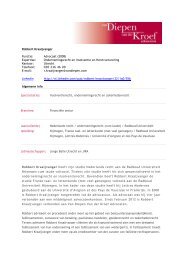© Van Diepen Van der Kroef Advocaten
© Van Diepen Van der Kroef Advocaten
© Van Diepen Van der Kroef Advocaten
- No tags were found...
Create successful ePaper yourself
Turn your PDF publications into a flip-book with our unique Google optimized e-Paper software.
issue of a hierarchy between the different norms of ius cogens. It is therefore obvious thatas a result in the event of a greater violation or a violation of the weightier norms of iuscogens the hierarchically lower rule of immunity must first yield. The Association et al.points out the distinction between the torture of an individual (as in the Al-Adsani Case) andthe genocide of 10,000 persons that the State of the Netherlands and the UN did notprevent. The grounds un<strong>der</strong>lying the decision in the judgment of the European Court ofHuman Rights and the dissenting opinion lead to the conclusion that in the case of theprohibition on genocide being a rule of ius cogens, the European Court of Human Rights willdecide that the immunity of a state would be subordinated to the rights of the individual.171. For that matter, the fact that immunity was accepted in the Al-Adsani Case (by nine of theseventeen judges) has been severely criticised (see for example A. Orakhelashvili, StateImmunity and International Public Or<strong>der</strong> Revisited, German Yearbook of International Law2006, pages 327 through 365). According to the author cited there should be a hierarchy ofnorms and there should be no absolute inviolability (immunity) of states. The judgment inthe Al-Adsani Case is seen as a violation of the right that should be safeguarded by Article 6ECHR (see Orakhelashvili, op. cit., page 347):‘The Al-Adsani treatment of Art. 6 is incompatible with the principle repeatedly affirmedin the ECHR’s jurisprudence, that the Convention must be interpreted so as to make itssafeguards practical and effective, and not illusory.’(…)‘All these consi<strong>der</strong>ations demonstrate that Al-Adsani is an inconsistent and badly reasoneddecision that was not worth following in subsequent cases.’172. The conclusions drawn by the District Court on the basis of the Al-Adsani judgment go muchfurther than is justified by the judgment. Al-Adsani concerns the immunity of a state whereanother court had jurisdiction to hear the action brought against that state. The EuropeanCourt of Human Rights judged only on ius cogens on the basis of the violation of Article 3ECHR alleged in that case, the prohibition on torture. The conclusion of the District Courtthat no generally accepted norm exists on the ground of which applicable immunitiesexceptionally lead in the framework of civil law to enforcement of the norms of ius cogens<strong>©</strong> <strong>Van</strong> <strong>Diepen</strong> <strong>Van</strong> <strong>der</strong> <strong>Kroef</strong> <strong>Advocaten</strong> page 73 of 99
















